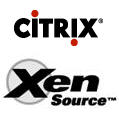Updated below
 Citrix Systems is acquiring XenSource, an open-source “virtualization” company that lets multiple operating systems operate on a single server, reducing costs.
Citrix Systems is acquiring XenSource, an open-source “virtualization” company that lets multiple operating systems operate on a single server, reducing costs.
The price, at $500 million, is a whopping return for Palo Alto Calif.’s XenSource, which formed less than three years ago, and raised $40 million in financing. The company was spun out of Cambridge University effort. It competes directly with VMware, the hot industry leader that went public yesterday with tremendous interest from investors.
The market is huge, because less than 10 percent of Windows-based servers have been “virtualized” and so these companies have plenty of room to grow without having to claw at each other.
Citrix is a large company that delivers Windows applications to large companies, and it has long sought a server virtualization technology to complement its offering in order to speed up the delivery of those applications from more efficient servers. (Citrix also plans to move to virtualize the desktop itself, which is considered another huge, lucrative market but is essentially unserved right now.)
Besides saving costs through consolidating the amount of hardware you use, virtualization also helps with things like disaster recovery of files.
The deal is a big win for Nick Sturiale, partner at Sevin Rosen Funds, and Kevin Compton, a former partner at Kleiner Perkins Caufield and Byers, who seeded XenSource with its first financial backing. Compton invested on behalf of that Kleiner, but also Radar, his own firm (Radar invested more money than Kleiner, so this is a big win for Compton personally). It’s a big deal for Sturiale, too. He’s one of the younger partners at Sevin Rosen, a firm that has struggled for direction of late, and which recently decided to not raise a new fund. This deal helps give Sturiale the track record needed to continue in the competitive venture industry, even if it’s without Seven Rosen. Other investors include Ignition, New Enterprise Associates and Accel Partners.
The key connection, though, was Compton. He’s a board member at both Xensource and Citrix, which certainly must have helped things along.
Update: As of this writing, Compton’s bio — link above — still says he’s on the board of Citrix. However, we’ve been informed by Nick Sturiale that Compton is no longer a board member there. We’re not sure when exactly he left.
Update II: Compton left the board two years ago. He’s had less to do with Kleiner recently, so it doesn’t surprise us that he failed to update his Kleiner bio. More notably, it turns out that Sevin Rosen had a partner who was a board member at Citrix (see comment below), which really does make this a shot-gun wedding, doesn’t it ;-)
VentureBeat's mission is to be a digital town square for technical decision-makers to gain knowledge about transformative enterprise technology and transact. Learn More
